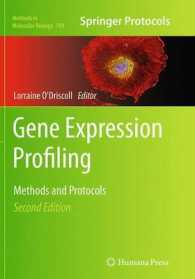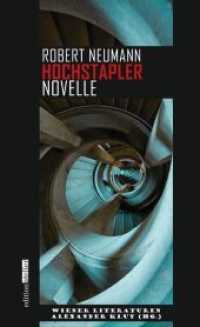- ホーム
- > 洋書
- > 英文書
- > Psychology
基本説明
Written for the professional psychologist and philsopher, Exploring Inner Experience shows (a) how DES avoids the traps that destroyed the introspections of the previous century; (b) why DES reports of inner experience should be considered reliable and valid; (c) that DES reports of inner experience are the most accurate that have ever been produced by Western science; and (d) how to use the DES method. This book will be basic reading for all psychologists, philosophers, and students interested in consciousness, as well as anyone (professional or layperson) who is seriously concerned with understanding the human condition or any of its components.
Full Description
Written for the psychologist, philosopher, and layperson interested in consciousness, Exploring Inner Experience provides a comprehensive introduction to the Descriptive Experience Sampling (DES) method for obtaining accurate reports of inner experience. DES uses a beeper to cue participants to pay attention to their experience at precisely defined moments; participants are then interviewed to obtain high-fidelity accounts of their experience at those moments. Exploring Inner Experience shows (a) how DES uncovers previously unknown details of inner experience; (b) how the implications of this method affect our understanding of inner experience and the human condition more generally; (c) how DES avoids the traps that destroyed the introspections of the previous century; (d) why DES reports of inner experience should be considered reliable and valid; and (e) how to use the DES method. This book will be basic reading for all psychologists, philosophers, and students interested in consciousness, as well as anyone who is seriously concerned with understanding the human condition.(Series B)
Contents
1. Preface; 2. 1. Inner experience; 3. 2. Amy's Inner Experience; 4. 3. Telling what we know: Describing inner experience; 5. 4. Psychological science's prescription for accurate reports about inner experience; 6. 5. To beep or not to beep; 7. 6. The Descriptive Experience Sampling procedure; 8. 7. Transcript of a DES Expositional interview; 9. 8. How to do DES: The moment of the beep; 10. 9. A Sampling Journal: Learning about DES; 11. 10. Bracketing presuppositions; 12. 11. Reliability and validity of DES; 13. 12. DES compared to other systems; 14. 13. Everyday inner experience; 15. 14. Implications of inner experience; 16. 15. Idiographic science; 17. References; 18. Index







